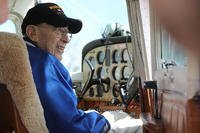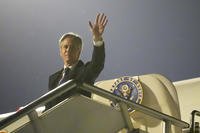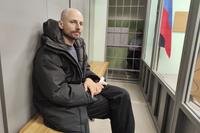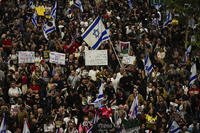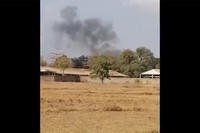SEOUL, South Korea — North Korean leader Kim Jong Un was to tour a Russian aircraft plant that builds fighter jets and then visit the country's Pacific Fleet, but his exact whereabouts remained uncertain, as South Korea on Thursday expressed “deep concern and regret” that his visit has focused so far on expanding military cooperation.
Washington has warned that the summit on Wednesday between Kim and Russian President Vladimir Putin could lead to a deal for North Korea to supply ammunition for Moscow’s war in Ukraine. There’s widespread concern in Seoul that North Korea in return would receive advanced weapons technologies from Russia, including those related to military spy satellites, which would increase the threat posed by Kim’s military nuclear program.
“We express our deep concern and regret that despite repeated warnings from the international community, North Korea and Russia discussed military cooperation issues, including satellite development, during their summit,” said Lim Soo-suk, South Korea’s Foreign Ministry spokesperson.
“Any science and technology cooperation that contributes to nuclear weapons and missile development, including satellite systems that involve ballistic missile technologies, runs against U.N. Security Council resolutions,” he said in a briefing.
Lim also pointed out that Kim’s delegation in Russia includes several people sanctioned by the Security Council over involvement in illicit North Korean weapons development activities, including Korean People’s Army Marshal Ri Pyong Chol and Jo Chun Yong, a ruling party official who handles munitions policies. Lim said Moscow should realize there will be “very negative impacts” on its relations with Seoul if it proceeds with military cooperation with North Korea.
South Korean Unification Minister Kim Yung-ho, who handles affairs with North Korea, warned that potential arms transfers between the North and Russia would invite stronger responses from South Korea, the U.S. and Japan, which have been stepping up their trilateral security cooperation to cope with regional threats.
White House National Security Council spokesperson John Kirby said Wednesday that North Korea would face consequences if it supplies arms to Russia.
“No nation on the planet, nobody, should be helping Mr. Putin kill innocent Ukrainians,” Kirby said. If the countries decide to move forward with an arms deal, the U.S. will take measure of the arrangement and “deal with it appropriately,” he said.
He said that any deal that would improve North Korea’s military capabilities “certainly would be of significant concern to us.”
The world has been largely relying on Russian and North Korean media for information about Kim’s diplomacy in Russia, which underscores an aligning interest between the nuclear-armed countries locked in escalating tensions with the West.
A day after giving intense coverage to the Putin-Kim summit, Russian media outlets were silent on Kim as of Thursday afternoon. North Korean state media have been reporting on Kim’s activities in Russia a day late and crafting their reports to support the government’s propaganda needs.
North Korea’s official Korean Central News Agency said on Thursday that Kim had invited Putin to visit North Korea at a “convenient time” and that Putin accepted with “pleasure and reaffirmed his will to invariably carry forward” the history of friendship between the nations.
Putin told Russian state TV after the summit that Kim will travel to two more cities in Russia’s Far East on his own, flying to Komsomolsk-on-Amur, where he will visit an aircraft plant, and then go to Vladivostok to view Russia’s Pacific Fleet, a university and other facilities.
During their meeting on Wednesday at Russia’s spaceport in the Far East, Kim vowed “full and unconditional support” for Putin in what he described as a “just fight against hegemonic forces to defend its sovereign rights, security and interests,” in an apparent reference to the war in Ukraine.
The decision to meet at the Vostochny Cosmodrome suggested that Kim is seeking Russian help in developing military reconnaissance satellites. He has previously said they are crucial to enhancing the threat of his nuclear-capable missiles, and North Korea has repeatedly failed to place spy satellites into orbit.
The aircraft plant in Komsomolsk-on-Amur would be another location that possibly hints at what Kim seeks to gain from Russia in exchange for help fueling Putin’s war on Ukraine.
Some analysts question whether Russia, which has always closely guarded its sensitive weapons technologies, would be willing to share them with North Korea in exchange for what may end up being limited supplies of munitions moved slowly through their small land link.
They say military cooperation between the countries could be more about conventional capabilities, such as Russia possibly helping North Korea improve its badly aged air force that remains reliant on fighter jets sent by the Soviet Union in the 1980s.
Putin told reporters that Russia and North Korea have “lots of interesting projects” in spheres like transportation and agriculture and that Moscow is providing its neighbor with humanitarian aid. But he avoided talking about military cooperation, saying only that Russia is abiding by the sanctions prohibiting procuring weapons from North Korea.
Wednesday’s meeting came hours after North Korea fired two ballistic missiles toward the sea, extending a highly provocative run in testing since 2022, as Kim used the distraction caused by war in Ukraine to accelerate his weapons development.
___
Litvinova reported from Tallinn, Estonia. Associated Press journalists Hyung-jin Kim in Seoul, South Korea; Mari Yamaguchi in Tokyo; and Jim Heintz in Tallinn contributed to this report.

